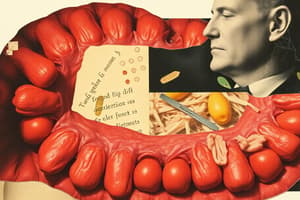Podcast
Questions and Answers
What are enzymes?
What are enzymes?
Enzymes are protein molecules produced by living organisms that act as catalysts in biochemical reactions.
How do enzymes affect the rate of chemical reactions?
How do enzymes affect the rate of chemical reactions?
Enzymes increase the reaction rate by acting as catalysts without being consumed in the process.
Enzymes help break down carbohydrates, fats, and proteins into simple compounds that the body can absorb and burn for energy or use to build or repair _______.
Enzymes help break down carbohydrates, fats, and proteins into simple compounds that the body can absorb and burn for energy or use to build or repair _______.
tissue
Which of the following is NOT a type of enzyme specificity?
Which of the following is NOT a type of enzyme specificity?
What is a cofactor?
What is a cofactor?
An enzyme without its cofactor is referred to as an _______.
An enzyme without its cofactor is referred to as an _______.
What are the two types of cofactors?
What are the two types of cofactors?
Match the following types of enzyme specificity with their descriptions:
Match the following types of enzyme specificity with their descriptions:
Flashcards are hidden until you start studying
Study Notes
Enzymes Overview
- Enzymes are protein molecules produced by all living organisms and act as efficient catalysts in biochemical reactions.
- They significantly increase the reaction rate—by factors ranging from 10^5 to 10^20—allowing reactions that would occur slowly or not at all to proceed swiftly.
- Enzymes remain unchanged after catalyzing reactions, meaning they can be reused multiple times.
Role in Digestion
- Enzymes play a crucial role in digestion, breaking down nutrients for absorption and energy use.
- Key digestive enzymes include:
- Amylase and lipase in saliva for carbohydrate and fat breakdown.
- Proteases like pepsin in the stomach for protein digestion.
- Additional lipases, amylases, and proteases are secreted in the small intestine to complete digestion.
Enzyme Efficiency
- Catalytic Power: Enzymes lower activation energy, facilitating quicker reactions and achieving equilibrium faster than in laboratory conditions.
- Specificity: Enzymes exhibit high specificity for their substrates, categorized into four types:
- Absolute specificity: Catalyzes only one particular reaction.
- Group specificity: Acts on molecules with specific functional groups (e.g., amino or phosphate).
- Linkage specificity: Targets specific types of chemical bonds irrespective of the molecular structure.
- Stereochemical specificity: Acts on particular steric or optical isomers.
Regulation of Enzyme Activity
- Enzyme activities can be regulated, controlling the rates of reactions and product formation within a cell.
- Regulation allows only a small subset of potential reactions to occur based on the enzymes present.
Cofactors and Enzyme Structure
- Some enzymes require non-protein components called cofactors for optimal activity; they can be:
- Coenzymes: Organic compounds.
- Activators: Inorganic ions.
- An enzyme without its cofactor is termed an apoenzyme, while the complete active enzyme with its cofactor is a holoenzyme.
- The relationship is summarized as: Apoenzyme + cofactor = holoenzyme.
Molecular Weight of Enzymes
- Enzymes have varying molecular weights, typically ranging from about 12,000 to over 1 million daltons.
- Some enzymes function solely with their amino acid residues, while others necessitate additional chemical components, including coenzymes or metal ions for activity.
Studying That Suits You
Use AI to generate personalized quizzes and flashcards to suit your learning preferences.




